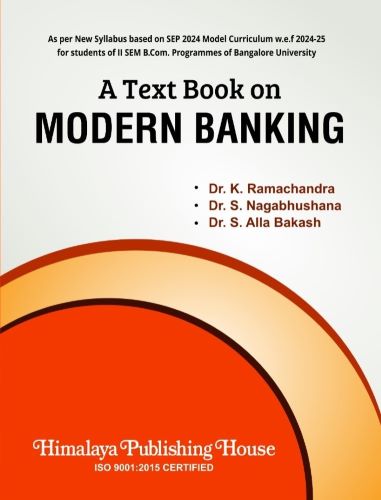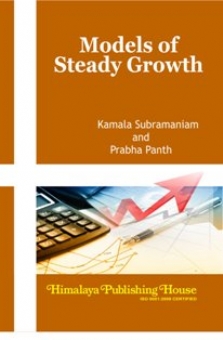The present book ‘A Text Book on Modern Banking’ is an attempt, sincere and honest attempt to incorporate all the new concepts, insights and to use utilitarian concepts for the benefit of the students’ community, teaching community, academia and industry at large. Every chapter as per Bangalore University syllabus has been comprehensively covered with living examples so also wherever necessary in a lucid manner the books explain the concepts which are new and varied.
The first chapter gives introduction to Indian Banking and Evolution of Indian Banking covering structure, RBI, Monetary Policy. The second chapter dwells on Types of Banks and Banker and customer relationship. Chapter three discusses the Negitionable Instruments, Promissory notes, Bills of Exchange, Types of Cheques and various types of endorsements. Chapter four deals with Digital Banking Services consisting of Internet Banking, Mobile Banking, Card Payments, UPI, ATMs, NEFT, IMPS, RTGS, Mobile Apps like Paytm, Google Pay and Apple Pay. Chapter five discusses Business Ethics in Banking, Ethical decision-making frameworks- Regulatory framework, RBI guidelines & SEBI regulations.
In the skill development component, list of detailed timeline in the evolution of Indian banking, comparison between Commercial & Co-operative Sectors and Scheduled & Non-scheduled banks, preparation of types of cheques, cybersecurity threats in digital banking and case studies on banking ethical dilemmas are given.
Indian Banking System is becoming vibrant in view of so many players and so many new financial instruments that are in vogue. Keeping this in mind the authors with their rich experience and research background have written ‘Modern Banking’ to meet the current requirements of 21st century millennium students.
Contents –
1. EVOLUTION OF BANKING
Origin of Bank – Meaning and Definition of Banks – Features of Bank – Evolution of Banking in India – Stages in Evolution of Banking in India – Structure of Indian Banking System – Reserve Bank of India (RBI) – Role & Importance of RBI – Functions of RBI – Monetary Policy Tools (Repo Rate, Reverse Repo Rate, CRR & SLR) – Banking Regulation Act – Prompt Corrective Action (PCA).
2. TYPES OF BANKS & BANKER – CUSTOMER RELATIONSHIP
Meaning, Role and Functions of Commercial Banks (Private Sector Bank, Public Sector Bank, Regional Rural Bank & Foreign Banks) – Co-operative Banks (State and Urban Co-operative Banks) – Scheduled and Non – Scheduled Banks – Payment Banks – Small Finance Banks – Development Banks. Banker and Customer Relationship – Meaning of Banker and customer – General Relationship – Special Relationship – Termination of Banker – Customer Relationship
3. NEGOTIABLE INSTRUMENTS AND ENDORSEMENT
Definition, meaning and characteristics of Promissory notes, Bill of Exchange and Cheque – Types of Cheques – Bearer, Order and Crossed – Types of Crossing- General and Special. Check truncation system, Endorsement – Definition and meaning of endorsement – Types of endorsement – Blank, Full or Special, Restrictive, Partial, Conditional, Sans Recourse, Facultative.
4. DIGITAL BANKING SERVICES
Meaning, Definition and Scope of Digital Banking – Evolution from traditional to digital banking – Advantages of Digital Banking – Digital Banking Services (Internet Banking, Mobile Banking, Card Payments, UPI, ATMs) – Digital Funds Transfer (NEFT, IMPS, RTGS) – Mobile Wallets & Payment Apps (Paytm, Google Pay, Apple Pay, Merchant payments) – Contactless Payment.
5. BUSINESS ETHICS IN BANKING
Introduction to Business Ethics in Banking – Meaning of Business Ethics & its importance in Banking – Ethical Issues in Banking – Ethical decision-making frameworks- Utilitarianism, Kantian ethics, virtue ethics – Regulatory framework for banking ethics: RBI guidelines, SEBI regulations and international standards (e.g., Basel Committee principles) – Ethical Leadership and Culture in Banking – Impact of technology on ethical practices in Banking operations
SKILLS DEVELOPMENT







